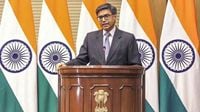Tensions escalated sharply between India and Pakistan on Friday, May 9, 2025, as the two nuclear-armed nations exchanged gunfire and accusations along their contentious border, raising alarms about a potential military confrontation. The conflict has seen a significant uptick in violence, with the death toll surpassing 50 over three days of missile, artillery, and drone attacks.
According to reports, New Delhi claimed it successfully repelled fresh drone and artillery strikes from Islamabad on the night of May 8. In response, Pakistan denied launching any attacks but accused India of escalating tensions, stating it would not "de-escalate". Pakistan's Foreign Ministry spokesman, Shafqat Ali Khan, criticized India's actions, asserting that they had brought the two countries closer to a major conflict. He condemned New Delhi’s suspension of the Indus Water Treaty as illegal and unilateral.
On the ground, the situation has deteriorated rapidly. The Indian military reported that it had "repulsed" waves of attacks from Pakistan, which allegedly involved hundreds of Turkish-made drones. Indian Foreign Secretary Vikram Misri condemned Pakistan's denial of these strikes as "farcical," asserting that Islamabad was engaged in a campaign of disinformation.
In the wake of the violence, residents across both nations have begun stockpiling food and essential supplies. In Lahore, a city close to the border, the sound of drones caused panic among residents, prompting them to rush to stores for provisions. Pankaj Seth, a resident of Amritsar in India's Punjab state, expressed concerns about the uncertainty of market operations, saying, "We do not know if the markets will open tomorrow or not...I have children and grandchildren at home so I have to stock up." Meanwhile, India's Consumer Affairs Minister reassured the public that there were sufficient food stocks, urging against panic buying.
The conflict has also severely impacted civilians in Kashmir, with reports of many fleeing their homes amidst shelling. In Indian-controlled Kashmir's Uri district, residents described harrowing scenes as houses were struck by artillery fire, forcing families to seek shelter in bunkers or behind rocks. Schools were closed on both sides of the border, affecting millions of children.
Adding to the chaos, India has closed 24 airports, with a possibility of resuming civilian flights on Saturday, May 10. The ongoing hostilities have disrupted international aviation, leading airlines to cancel flights or reroute to avoid the Indian-Pakistani frontier.
The escalation of violence comes in the wake of an attack on tourists in Indian-administered Kashmir last month, which left 26 people dead. India retaliated with airstrikes on what it termed "terrorist camps" in Pakistan on May 7, resulting in significant civilian casualties. Pakistan's military spokesman, Ahmed Sharif Chaudhry, stated, "We will not de-escalate – with the damages they did on our side, they should take a hit," emphasizing that Pakistan would respond in its own time.
In a further escalation, Foreign Secretary Vikram Misri accused Pakistan of targeting Indian cities and civilian infrastructure, including schools and places of worship in Jammu and Kashmir's Poonch district. Misri described the targeting of religious sites as a "new low even for Pakistan," highlighting the tragic death of 13 civilians, including four children, due to shelling on May 7. Misri condemned Pakistan's attempts to shift blame onto India, asserting that the claims were outrageous and indicative of Pakistan's disinformation campaign.
Pakistan has also been accused of launching a fresh wave of drone strikes against India, targeting cities, military bases, and places of worship. Early on Saturday morning, May 10, a spokesperson for the Pakistan army claimed that India had fired ballistic missiles that fell within Indian territory. Witnesses reported explosions in both Amritsar and the Pakistani cities of Islamabad and Rawalpindi.
As tensions mount, the situation remains precarious. Students and families in Jammu described the fear and confusion resulting from the violence, with one local student stating, "Skirmishes and exchanges of gunfire are nothing new to us, but what happened on Thursday night was extraordinary. We saw fiery objects launching from the Pakistani side; the barrage was so intense it looked like fireworks lighting up the sky."
In an effort to control the narrative, India has initiated a crackdown on misinformation, ordering social media platforms to block thousands of accounts. This move has drawn criticism and raised concerns about freedom of expression amid the ongoing conflict.
As the international community watches closely, calls for de-escalation have emerged. U.S. Vice President JD Vance underscored that Washington would remain uninvolved in what he described as a war that is fundamentally none of its business. Meanwhile, several countries have offered to mediate, but the situation remains fraught with tension.
The ongoing violence and accusations between India and Pakistan highlight a critical moment in South Asian geopolitics, with both nations at a crossroads that could lead to further escalation or potential dialogue. With the memory of past conflicts still fresh, the world watches anxiously to see how this latest chapter unfolds.




